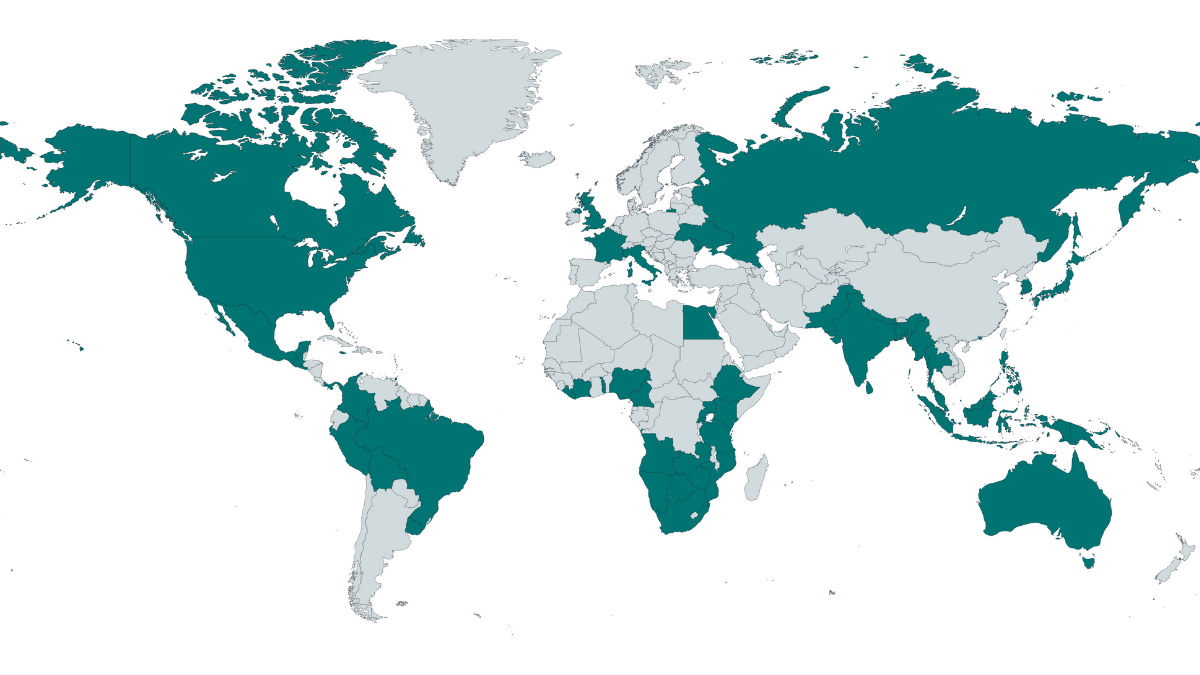


Global Network Survey 2022
February 4, 2022


From Lockdown to Launch: ICCSA and GTP
February 9, 2022What biblical support affirms the global pattern of peer accountability?
When people hear that GTP helps set up or strengthen peer accountability groups around the world, they often ask questions such as these: What is a peer accountability group (or PAG)? Why does GTP want to see PAGs flourishing globally (or why is trust so vital)? How do the Scriptures encourage peer accountability and building trust? Let’s answer them one at a time.
What is a peer accountability group (or PAG)?
A PAG is a group of churches or ministries that holds each other accountable to follow standards of responsible stewardship and verifies compliance to grow trust. ECFA, for example, is the PAG in the USA. So, to maintain ECFA accreditation, a Christ-centered church or ministry must demonstrate compliance with the ECFA's Seven Standards of Responsible Stewardship™ on an annual basis.
While the wording of the standards may vary by country or region, the standards mark the expected practices in areas such as Christian commitment, diligent governance, legal compliance, financial transparency and disclosure, compensation, and gift administration. Faithful work in these areas honors God, and when that effort is verified externally and authenticated with a seal, the PAG members collectively enhance trust.
Why does GTP want to see PAGs flourishing globally?
One of the primary obstructions restricting the flow of resources to organizations who need them is a lack of accountability necessary to support the level of trust required to release those resources. If trust represents the flood gates that allow the flow of resources, then accountability is the mechanism by which the gates remain open.
For organizations to thrive in a sustainable way, they need both internal and external accountability. That’s why healthy businesses and governments alike go to great lengths and expense to establish accountability and protect their reputation as trustworthy and reliable. It’s also why GTP created the Diagnostic Tool and Templates to empower church and ministry workers with tools and templates to build trust.
In my work in the investment management arena, for example, we have layer upon layer of standards, compliance policies, transparency requirements and verification. Without this intentional and systematic accountability, our financial system and markets would be vulnerable to pervasive breaches of trust and the ability to engage in economic transactions would unravel. The same is true for churches and ministries. In God’s Word, we actually find that the level of trust and accountability expected of God’s workers should be greater than what the world expects.
How do the Scriptures encourage peer accountability and building trust?
Jesus established the pattern of peer accountability when He sent the disciples out on mission. In Luke 10:1-12, we read that Jesus sent them out two by two. He gave them explicit instructions on how they were to interact with and engage the communities they served and to depend on God to supply their needs through receptive people. By sending them in pairs, Jesus instilled a mindset of collaborative accountability. He knew that their consistent witness could multiply trust.
The early church followed the pattern with individuals and groups. Mission throughout the book of Acts happened two by two by people. As the movement grew, the Apostle Paul urged churches to reflect a consistent witness. For example, in 1 Corinthians 16:1-4, he gave the same directions to the Corinthians that he had given to the churches of Galatia: have trusted people “approved with letters” or with credentials handling the charitable giving. This was the standard for all churches. Then in 2 Corinthians 8:20-21, he explained the importance of this. “We want to avoid any criticism of the way we administer this liberal gift. For we are taking pains to do what is right, not only in the eyes of the Lord but also in the eyes of man.” He wanted churches everywhere to comply with laws and reflect a consistent, higher standard to preserve trust and to honor God. This pattern continues today.
Join the movement!
Working together globally and engaging in peer accountability is an important theme woven into the fabric of God’s design for churches and ministries before a watching world. Whether in our personal lives, business activities, or serving others, those who join the peer accountability movement foster sustainability and positions churches and ministries for growth and impact.
Our Lord Jesus Christ taught and promoted peer accountability. It is a biblical pattern followed by the Apostles, which contributed to the expansion of the early church. As we join the movement, we too will set the stage for a significant harvest. A properly functioning system of accountability is the fuel for multiplication and sustainability and a key to unlocking the gates that constrict the flow of resources to much needed areas.
–––––
Click here to locate the fellowship of PAGs that aim at growing accountability and trust with standards that are biblically faithful, globally consistent, and locally contextualized.¿Qué Soporte Bíblico Afirma el Patrón Global de Rendición de Cuentas?
Cuando la gente escucha que GTP ayuda a iniciar o fortalecer la rendición de cuentas, a menudo se hacen preguntas como estas: ¿qué es un Grupo de Rendición de Cuentas (PAG, por sus siglas en inglés)? ¿por qué GTP quiere ver los PAGs prosperar globalmente (o por qué la confianza es tan vital)? ¿Cómo las escrituras alientan la rendición de cuentas y el construir confianza? Respondamos estas preguntas una por una.
¿Qué son los grupos de rendición de cuentas?
Un PAG es un grupo de iglesias o ministerios que se rinden cuentas unos a otros para seguir estándares de mayordomía responsable y verifican su cumplimiento para hacer crecer la confianza. ECFA, por ejemplo, es el PAG en Estados Unidos. Así que, para mantener la acreditación de ECFA, las iglesias y ministerios Cristocéntricos debendemostrar cumplimiento con los Siete Estándares de Mayordomía Responsable de ECFA™ anualmente.
Si bien la redacción de los estándares puede variar por país o región, los estándares marcan las prácticas esperadas en áreas como el compromiso cristiano, la gobernanza diligente, el cumplimiento legal, la transparencia y divulgación financiera, la indemnización y administración de donaciones. Un trabajo fiel en estas áreas honra a Dios, y cuando ese esfuerzo es verificado de manera externa y autenticado con un sello, los miembros de los PAGs aumentan la confianza de forma colectiva.
¿Por qué GTP quiere ver a los GRC prosperar globalmente?
Uno de los obstáculos principales restringiendo el flujo de recursos para las organizaciones que los necesitan es la falta de rendinción de cuentas necesaria para mantener el nivel de confianza requerido para liberar esos recursos. Si la confianza representa las compuertas que permiten el flujo de recursos, entonces la rendición de cuentas es el mecanismo por el cual las compuertas permanecen abiertas.
Para que las organizaciones prosperen de una forma sustentable, necesitan rendición de cuentas interna y externa. Es por esto que los negocios saludables y los gobiernos de la misma manera hacen grandes esfuerzos y gastos para establecer rendición de cuentas y mantener su reputación como una de confianza y fidedigna. También es la razón por la cual GTP creó la Herramienta de Diagnóstico y las Plantillas para empoderar a los trabajadores de la iglesia y ministerio con herramientas y plantillas para construir confianza.
En mi trabajo en el área de gestión de inversiones, por ejemplo, tenemos capa tras capa de estándares, políticas de cumplimiento, requerimientos de transparencia y verificación. Sin esta rendición de cuentas intencional y sistemática, nuestro sistema financiero y mercados serían vulnerables a abusos de confianza generalizados y la capacidad de participar en las transacciones económicas se desmoronaría. Lo mismo es cierto para iglesias y ministerios. En la Palabra de Dios, realmente encontramos que el nivel de confianza y responsabilidad que se espera de los obreros de Dios debería ser mayor de lo que el mundo espera.
¿Cómo las Escrituras incentivan la rendición de cuentas y la construcción de confianza?
Jesús estableció un patrón de rendición de cuentas cuando envió a los discípulos a la misión. En Lucas 10:1-12 leemos que Jesús los envió de dos en dos. Les dio instrucciones explícitas de cómo debían interactuar y participar con las comunidades a las que servían y de cómo depender de Dios para suplir sus necesidades a través de personas receptivas. Al enviarlos en pares, Jesús instaló una mentalidad de rendición de cuentas colaborativa. Él sabía que su testimonio coherente podría multiplicar la confianza.
La iglesia primitiva seguía un patrón de individuos y grupos. La misión a lo largo del libro de Hechos sucedió de dos en dos personas. Mientras el movimiento crecía, el apóstol Pablo animaba a las iglesias a reflejar un testimonio coherente. Por ejemplo, en 1 Corintios 16:1-4, él le dio las mismas instrucciones a los corintios que había dado a las iglesias de Gálata: tengan personas de confianza con “cartas de aprobación” o con credenciales manejando las donaciones caritativas. Este era el estándar para todas las iglesias. Después en 2 Corintios 8:20-21, él explicó la importancia de esto. “Queremos evitar cualquier crítica sobre la forma en que administramos este generoso donativo; porque procuramos hacer lo correcto, no solo delante del Señor, sino también delante de los demás.” Él quería que las iglesias en todas partes cumplieran con las leyes y que reflejaran un estándar consistente y más alto para preservar la confianza y la honra a Dios. Este patrón continúa el día de hoy.
¡Únete al movimiento!
Trabajar juntos de manera global y participar en la rendición de cuentas es un tema importante entretejido en la estructura del diseño de Dios para las iglesias y ministerios ante un mundo que observa. Ya sea en nuestras vidas personales, actividades de negocio o en el servicio a otros, aquellos que se unen al movimiento de rendición de cuentas fomentan la sustentabilidad y colocan a la iglesia y ministerios en una posición para el crecimiento e impacto.
Nuestro Señor Jesucristo enseñó y promovió la rendición de cuentas. Es un patrón bíblico seguido por los apóstoles, el cuál contribuyó a la expansión de la iglesia primitiva. Mientras nos unimos al movimiento, también estaremos preparando el terreno para una gran cosecha. Un sistema de rendición de cuentas que funciona adecuadamente es el combustible para la multiplicación y sustentabilidad, y la clave para abrir las puertas que restringen el flujo de recursos para las áreas necesitadas.
–––––
Haz clic aquí para ubicar a los diferentes Grupos de Rendición de Cuentas que tienen como objetivo aumentar la responsabilidad y confianza con estándares que son bíblicamente fieles, globalmente consistentes y localmente contextualizados.




